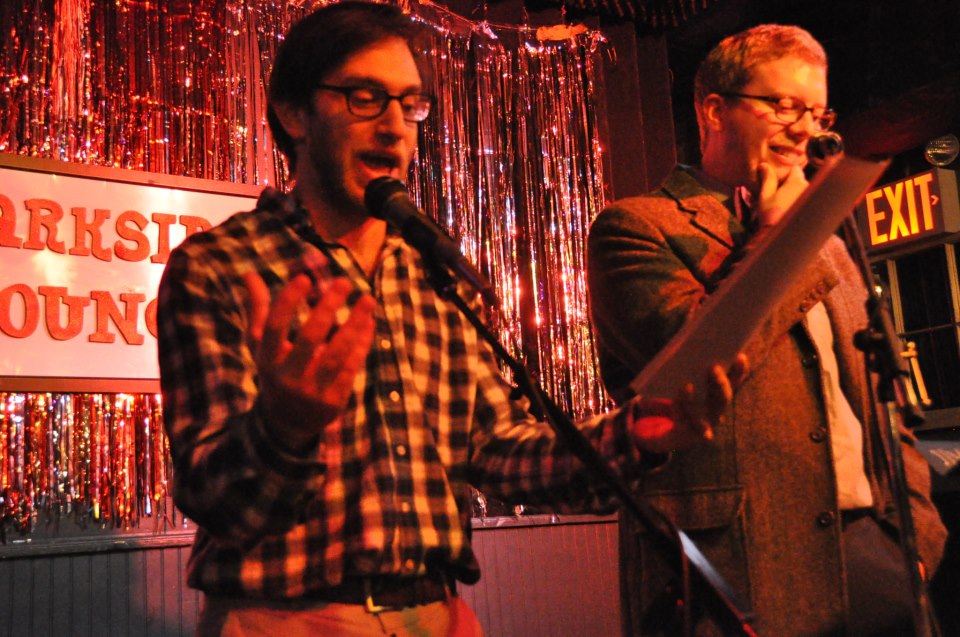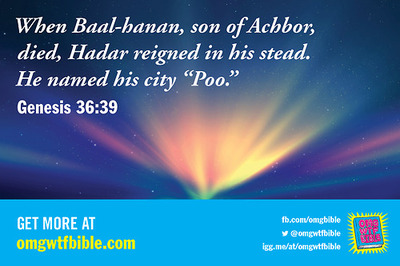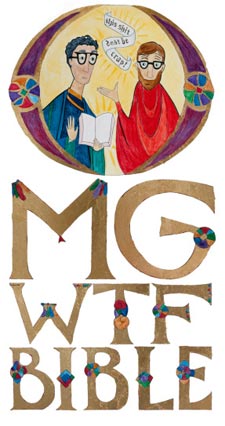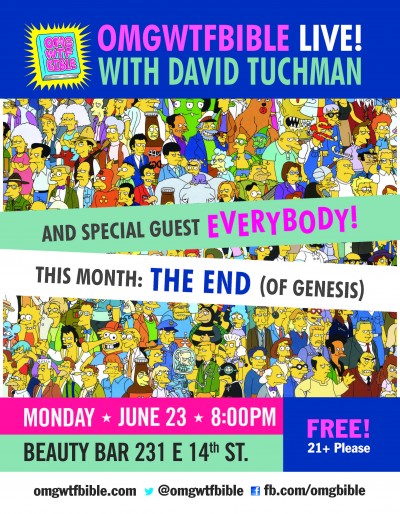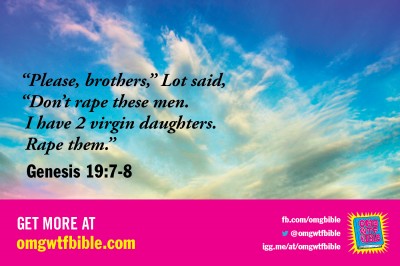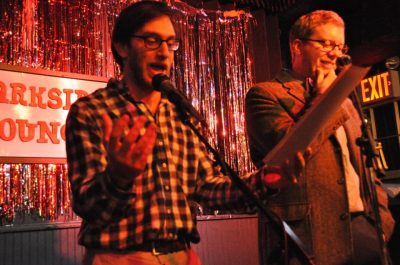
Part live spectacle, part Biblical scholarship, comedian David Tuchman’s OMGWTFBIBLE podcast “reframes the Bible as the world’s oldest weekly comedy serial.” A year-and-a-half after its debut in April 2013 (as seen in New Voices), he’s now heading into Exodus. I caught up with David recently in the food court of Grand Central Station to discuss how the project has evolved over its first book. As he ate a huge deli sandwich from Mendy’s, Grand Central’s only kosher eatery, we discussed life, God, LARP-ing, The Simpsons, and everything else that matters.
Derek Kwait: How has the project changed, if at all, since the project began? What is your relationship to the Bible now?
David Tuchman: I think I was a lot angrier when I started. I originally thought it was going to be a lot more irreverent than it ended up being. When I started, I thought I was going to be rejecting a lot of traditional understanding and traditional translations and be as new and as fresh as I possibly could, but in working on it and putting in all the effort I put into it, I realized there are a lot of translations that are really funny and crazy and interesting, especially in the Midrash. I was having a conversation last night, we were debating whether Midrash was fan-fiction or like really complicated retconning, like in a comic book, and it’s a little bit of a combination of both, there’s so many crazy things there that I love sharing.
So which do you think is the funniest translation?
Young’s Literal Translation…Oh God, it’s so painful. It’s…I…it’s admirable, because it sometimes can very often be hard to get through. One of the biggest challenges I find is in writing dialogue that is readable, and, I really admire what that man did for trying to stay as true as possible to it because it’s like really unreadable in the English.
Now that’s an accurate translation.
Oh yeah, very accurate. I’ve also found that there are some tools online that will go through the Hebrew word-by-word and match it with the concordance word. Which is very interesting and would be very helpful if I had the patience to go through it.
Another thing that’s changed, if you listen to the first episode, the first translation is really, really, really loose, and as I’ve gone on, I’ve actually wanted to match the original text more closely, so that it would feel more like a real translation. So if I ever release this as text, I would like to the first chapters or so and change it so that it matches what I’m doing now. I’ve also found that it has gotten a lot easier to do, it was much harder to do when I started.
Why do you think you’re less angry now than when you started?
I think that when I first started, I was a little bit more ignorant about many ways of approaching the text within Judaism. And as I went on, I learned and met so many people through this process that I realized that what I’m doing is a lot more in line with Jewish traditions than I originally had thought it was. So I kind-of went from feeling like I was an outsider who’s fighting against the establishment to realizing that I’m part of a grand tradition of interpreting and grappling with this text.
On that note, you know the saying in the Talmud that “The Torah speaks in the language of man.” How do you relate to that, personally or through your work?
I think that—and I could just be getting the concept wrong–but to me, I think there’s kind-of a grappling with it—”The Torah speaks in the language of man” but as we see it right now, it doesn’t, it speaks Hebrew. So we have to in a way make it something that’s in our own language so that we can make it something we can engage with, and that’s what I’m hoping to try to do. One of my favorite translations to read in this is The Living Torah by Aryeh Kaplan. It’s the easiest to read and the most fresh. But what I’m trying to do is make the Tanakh speak the language that we speak right now so that it becomes a story or a book or a collection of books that’s meaningful to people, in whatever way- with whatever that means, whether they are religious or not.
I’ve noticed a lot of times when people talk about the Bible, they can’t do it without sounding like the King James kind of language of it, and that automatically antiquates it.
That’s very frustrating to me, because, you know, when the King James Version was written, that was the language that people spoke. And when the Hebrew was written, that was the language that people spoke, and that was a very poetic language, and the only way we can read it and really feel like we’re creating the text as we read it is if we read it in language that makes sense to us. You know there’s a lot of repetition and weird phrases and weird syntax that people are in love with. I understand why, but people will hold on to it very tightly, and that just makes it hard to read and hard to get there.
How has the project changed you so far?
I feel like it’s mellowed me out a lot when it comes to religion, partly because the people who I’ve been talking to or the people I’ve had on as guests, and partly just by reading through it. I’ve started to understand why the book appeals to so many people, and why this has worked for so long. I’ve also hit pockets where I feel like, ‘Okay, this is really a product of its time.’ I’ve become a lot more versed in talking about religion than I have been before, and in a way, I’ve become somewhat more religious. I take the idea of Shabbat much more seriously than I did when I started-
Would you have chosen to eat at Mendy’s when you started the project?
No, I don’t think so. That’s a good question. I think that, the way I think of religion now is just the world’s biggest LARP. I think of it as—again, there are many people who don’t think of it this way—but in a lot of ways, it’s a practice that you go into, whether voluntarily or not depending on who you are, and it’s a way of guiding your life. When we start—I think it’s very important to keep grounded in the idea that “the Torah speaks in the language of man,” whatever that means, and the words in the narratives were written thousands of years ago in the language of man and in the aspects of man and habits of man that were very different than they are now. If we hold what we see as the “traditional” way of understanding things over how we approach it or how we feel about it, I think that it can make us lose our way, that if we remember that this is something that we’ve in some way we’ve chosen to be a part of, we’re a bit more mellow about our religion and our practice and about other people not doing the same things we’re doing. I think you get into a lot of trouble when something, especially when it’s your interpretation because one thing I keep coming back to is that this is all in Hebrew, and unless you’re a Hebrew speaker, everything you’re reading is an interpretation, and everything you take out of this is an interpretation. When you forget that it’s interpretation and you think that it’s the absolute word of God, that’s when you start to get into trouble, and start hurting people, whether emotionally or physically.
That’s the definition of fundamentalism, right?Exactly. It’s so funny to me how much, especially in English versions, how much the Hebrew’s just dropped. Like, I was translating something in Exodus [chapter] 38 where it talks about the “‘tzva tzvaot” or “the legions of the legions” were standing near the sink, I think, near the assembly and based on Rabbinic translations, we understand that that means the women because their legions came out of these legions of women, but if you look at a lot of the English translations, the Christian translations just say the women were standing by the washstand.
Aww, that’s lame.
But that’s not necessarily what it means. So it’s very weird how much fealty there is to language that’s hundreds of years of trying to figure out what this language means.
That’s so much of the problem in the English-speaking world, we just know the Bible as King James, so anything else just seems-
Exactly, and there’s so many words that are lost. … I also have a lot of fun arguing with Christians on Twitter about what the Hebrew says. I’ve been doing that a lot more.
Heading into Exodus, are there any concrete changes you’re going to make? Not just to your approach, but to the whole presentation, or to the shape of the show?
Absolutely, actually. In terms of the translation, I’m going to attempt not to use the word “God” in the translation, because we translate YKVK as “Yehova,” and then there’s the word “Elohim,” which I’ve been translating as “God,” but I think I want to just translate it as “Elohim.”
I thought that seemed odd, to translate one and not the other.
Yeah, I did it because I wasn’t quite sure what I was doing, and I for some reason felt like “God” had to be in here, but I think from now on, I’m going to use the names that the text uses, because every translation that I see, usually unless they are real hippy-dippy ones, translate it as “God” or “the Lord our God” or something like that, and I feel like you lose some of what the text actually meant to people who were talking perhaps about these named deities when it was written. And I want to leave that up to the interpretation of the person that’s listening. If they want that to stand for God, then that’s up to them. Structurally, what I’d like to do—and we’re going to see how well this works when I do the next episode—instead of arbitrary chapters in each episode, I’d like to do an entire parsha in each live episode, which might make the live show a little bit longer, and then chunk it up so that the show becomes as close to weekly as possible, so that we’d have about a 20-minute long podcast each week, and then over the course of time, they would hear the entire parsha.
That would be great for people looking to write divrei Torah for a given week. Plus, once a week would possibly create a more regular audience.
Absolutely. It won’t be a d’var Torah every week, it will be like once every four episodes there will be this summation of everything, but still it will be more regular than once-a-month or whenever I get to it.
You mention in your quote to Shalom Life on the blog that reading the text “together is central to our faith and can bring us closer together.” Do you feel that this project has facilitated that among Jews, created a community based around learning life-lessons from your reading of the Torah aloud? It’s like you’ve created your own Hakel [once every 7-years public reading of parts of the Torah in Biblical times].
I kind-of have! It’s been really surprising, when I first started this, the only people who came were the ones I was able to badger into coming to see me do this weird thing, and now the people coming are the people who want to be a part of this group that’s listening to the Tanakh together then talk about it afterwards, talk about what we’re hearing. Now I’m getting people who get the jokes that I make in translation that they tell me you only understand if you actually know the Hebrew too. I’m blown away by that.
Is that your target audience? What is your target audience?
My target audience is… somewhat fluid. It seems like the core audience right now are somewhat more liberal Jews—Jews with a more liberal approach to reading the Tanakh, of understanding the Tanakh, who are open to re-looking at it. I think that Jews who may have left more stringent kinds of Judaism and are still figuring out what Judaism is to them can find a lot in it. And I think that it appeals to people who have an interest in religion, or maybe atheists from all kinds of religions or who were just born atheists and are just interested in it. I hope to have Steve Wells, who wrote The Skeptic’s Annotated Bible on the show once.
On your blog, posts not directly related to the project usually either involve religious people getting the Bible wrong like Ken Ham or the Chasidim who edit the Bible or else religious people doing secular things, like that Modern Orthodox kid who did the dirty comedy or the nun, or else secular culture embracing the Bible, like the secular philosophers sharing their favorite verses. Where does this project fit into this spectrum? Have religious people so defamed the Bible that now it’s up to secular people to resuscitate it in the public sphere?
I think maybe they have. Sometimes I think that people who call themselves religious might not necessarily be the most religious people, they might be the most fundamentalist. But to me, people who are the most religious are the ones who have humility about God and the divinity of this kind of stuff. The people who are absolutely 100% sure and want everyone to go along with them don’t feel very religious to me. And the people who ask questions feel the most religious. I think I said this in the episode where Yaakov wrestles with God, or whatever it is he wrestles with, and takes on the name Yisrael—I actually feel like what I’m doing is an incredibly Jewish thing to do. To me “Yisrael” means “wrestling with El” or “with God.” So to me, the founding myth of the nation of Israel is this act of wrestling with the concept of God, and it can only come to a standstill, I think. You can only get to the point where nobody gives any ground. The best you can do with the idea or the concept of the reality of God is say, “I don’t really know.” And I think even hardcore atheists who really know what they’re talking about are kind of like, “Oh, we don’t really know, but we’re mostly sure there’s no God.” I’m not saying that they’re wrong, but I think that wrestling with our tradition is the most Jewish thing that we could possibly be doing. So I sometimes feel like what I’m doing is a very religious thing in a somewhat secular way. I never really thought that much about the things that I post, they’re usually just things that amuse me that have something to do with religion, but I do feel like religion might sometimes need a shot in the arm from people who have a fresh take. It can sometimes—I’m making broad statements about things I don’t really know, but people can feel very sidelined when they see ways of leading a congregation that just seem like preaching to the choir for those who were brought up in it our already believe it. For those who want something more, it might not work out. I sometimes think that had what I’m doing existed when I was a teenager going to yeshiva…I might not have stopped going to yeshiva.
What do you think the relationship of secular culture or pop culture should be to the Bible?
It’s weird because it seems like there’s suddenly so much culture around the Bible. I think that the Bible has been unjustly denigrated or unfairly denigrated within our literary canon. Like, I think because of what it’s used for or all the stuff that people hang on it, I think it lives in a somewhat separate place in terms of our culture. I think it’s a really important part of our culture and it can be treated as pop culture and people would be much more literate in it if we did, and I think it certainly has a place—you know I don’t want to see these mythical movies made out of Noah or Moses, I’d take a lot of pleasure if we saw pulpy films made out of the wackier stories in the prophets.
That would be amazing.
Or like a Game of Thrones-style show about ancient Israel.
They tried that at some point, didn’t they?
That Kings thing, right? But that was a little bit too modern. Like we need to get raw, like really.
I noticed you use The Simpsons in a lot of your promotional pieces, and it occurred to me that for our generation, growing up with it was a fundamental aspect of how our worldview and values are formed, quotes from it and its language is ubiquitous in our speech and signals someone who has important things in common with us. Was your use of The Simpsons intentional? What do you think is the modern equivalent of the Bible in this way?
I mean, my girlfriend makes my flyers and we just really like The Simpsons, but it just feels like there are these cultural touchstones that you can quote and everyone gets, and to me the biblical stories always occupied a place in my mental space that was kind of similar with these comic book or cartoon characters—it was like one of those things that was always there, and you didn’t quite know when you first learned these stories. I would love to live in a world where we can treat the Bible with enough reverence that we can quote it as goofily or as liberally as we do The Simpsons. But stuff like The Simpsons or Seinfeld, it feels like it really influences the way that we live, or even Arrested Development. It’s a piece of our shared culture, and maybe in a way I’m hoping that we can treat the Bible as a piece of our shared culture in the same way that we do something like The Simpsons or Seinfeld.
While reading the blurb from Brian Doyle in The American Scholar, it occurred to me that, the more we learn about how Jewish customs and beliefs originated, the more Judaism seems to be, moral parody of ancient idolatry, like everything we do is a flip or a parody of what they do, how do you think that this fits into this in a more modern way, or how can Judaism be that way in modern society, if at all?
I find that in a lot of ways, Judaism is an attempt to make more sacred lives….I don’t know if I’m the person to answer this question.
It just occurred to me, I thought I’d throw it out there.
This question makes me think of that Alain de Botton book. Religion for Atheists, where we’re not- we don’t quite know how to use our culture- like we have culture, but we’re not sure how to use it in a way that will bring us together.
That’s so true, especially today when there’s just so much culture penetrating everything, you don’t even know what to do with it all.
Right. And in the book, he talks about going into an art museum, and having this very revered, almost sacred experience, but you don’t even know what to do with it, so you just go and walk through the halls, and I think perhaps Judaism-and I’m not sure how we do this—but Judaism can be a way to take- he actually gives examples for how religion can be a guide for how to take a culture and how to use it as a source of meditation, and fostering a feeling of the familiar, a feeling of equality. I think the two things that stick out to me right now that Judaism does incredibly well are taking a break and mourning. Jewish rituals, especially now that we are so tech-savvy…it’s weird how perfect Judaism is for that. The idea that we are so inundated by culture and by tech and by electronic devices and by our screens, and the idea of creating a space where for 25 hours we’re not doing any of that, we’re standing in awe, we’re kind-of finding ourselves out, is really important in our world right now, and if everyone did that, we’d be a lot more relaxed, a lot more chilled. And it really is the flip of what the world is right now.
Absolutely. The world seems so everything, all at once, all the time, that you really need that.
Shabbat is really about like removing yourself from creation, so from the creation of the constant turn of culture, too. We’re all constant creators now. Anyone who posts on Facebook is creating things. Just take a break for a day.
How would you feel if someone who was completely secular and didn’t grow up religious listens to your podcast and that starts them learning more about the Bible, and that leads to them becoming mainstream Orthodox, eventually?
I would be very surprised. I hope that if their kid then grows up and wants to do a podcast like mine, they don’t kick them out of the house, and they remember where they came from. Or a braincast, or whatever they’re calling it.
So I’m a fairly religious person, and I feel like I should be offended by your podcast, but except for the use of the names of God, I wasn’t. Why was I not more offended by your podcast?
It’s sort of wrapped in an offensive package because the name is somewhat offensive and somewhat off-putting for some people, depending on how old you are, usually. But what I’m trying to do is to tell these stories in an enjoyable way, I’m not trying to offend anybody or mock them. Sometimes I’ll make point out something that’s kind of weird about them, but the humor is usually additive to the stories, as opposed to tearing them down. What I really want to do is get people to know this book and to have fun reading it. Whether it inspires them to religion or not is their choice, but all I want to do is tell these stories.
Have you gotten any negative feedback?
I think one person who picked a fight with me once on my Facebook page, and I referred her to posts where I defend the name on WordPress, and I told her, “Listen to the show, let me know if the show bothers you. If the show bothers you, that’s one thing, but the name is kind of a joke.” I’ve gotten a few angry Facebook messages from really upset Christians, but that’s really not- I’ve been surprised by how positive the response has been.
I think it’s really hard not to see how essentially Jewish what you’re doing is.
Right. And I think people kind-of get that.
